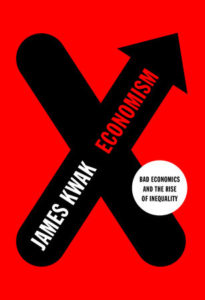Link to an article by Ralph Nader:
Tag: Economics
Honest Accounts 2017: How the World Profits from Africa’s Wealth
Link to a report by Global Justice Now:
“Honest Accounts 2017: How the World Profits from Africa’s Wealth”
James Kwak – Economism: Bad Economics and the Rise of Inequality
James Kwak – Economism: Bad Economics and the Rise of Inequality (2017)
Probably everything readers need to know about James Kwak’s book Economism comes from this quote by Richard Wolff (which, incidentally, pre-dates the writing of Kwak’s book):
“over the last 50 years, the major debate in mainstream economics has been between neoclassical devotees of laissez-faire and Keynesian devotees of government economic interventions. From the Great Depression through the 1960s, Keynesian economics prevailed and neoclassicals were marginalized. Since then the reverse situation has obtained. The crisis since 2007 shifted some influence back to the Keynesians, but the old debates continue. While both sides disagree on much, they do both endorse capitalism as ‘the best’ economic system and they do both cooperate to exclude Marxian economists from their debates, discussions, journals, and campuses.”
Kwak is kind of a “new Keynesian”, so naturally he fights against neoclassical monetarist economic theocracy, at a time when Keynesians have regained some prestige, while subtly joining with them to declare “there is no alternative” to their shared capitalist assumptions — a form of “university discourse”. What is most embarrassing about his book is that the title, “Economism,” is a term coined by Marxists like Lenin to describe bourgeois economists who sought to exclude class struggle from discourse and pursue trivial reformist trends. In other words, Lenin would have excoriated Kwak as guilty of “economism”! Then again, like all Keynesians, Kwak is quite explicit that he would consider a democratic, Bolshevik-style revolution to be terrible — an outcome to avoid at all costs. He makes a concerted effort to signal that he is an anti-communist cold warrior. This is part of a larger trend of substituting “inequality” for class-based study of capitalism against alternatives in economics. Anyway, Kwak’s book is pretty superfluous. There are many, many books like this already in print. Kwak’s is very readable, maybe more so than some others. Yet the way it tries to paint neoclassical economists as ideologues while implying that its new Keynesian perspective is non-ideological is a joke — Kwak can fairly be accused of promoting ideology masquerading as a critique of ideology.
John Kenneth Galbraith Quote
“The modern conservative is not even especially modern. He is engaged, on the contrary, in one of man’s oldest, best financed, most applauded, and, on the whole, least successful exercises in moral philosophy. That is the search for a superior moral justification for selfishness.”
Stephen Resnick & Richard Wolff – The Economic Crisis
Link to an article by Stephen Resnick & Richard Wolff:
Walden Bello – Europe’s Faustian Bargain with Big Finance
Link to an interview of Walden Bello:
Michael J. Coren & Clive Thompson – Luddites Have Been Getting a Bad Rap for 200 Years
Link to an interview of Clive Thompson conducted by Michael J. Coren:
“Luddites Have Been Getting a Bad rap for 200 Years. But, Turns Out, They Were Right”
Bonus link: “When Robots Take All of Our Jobs, Remember the Luddites”
Salvador Rangel & Jeb Sprague-Silgado – The U.S. Political Scene
Link to an article by Salvador Rangel & Jeb Sprague-Silgado:
“The U.S. Political Scene: Whiteness and the Legitimacy Crisis of Global Capitalism”
Really one the best general summaries of the Trump phenomenon and its underlying drivers and political base.
Don Hazen & Jonathan Taplin – The Massive Monopolies of Google, Facebook and Amazon
Link to an interview of Jonathan Taplin, author of Move Fast and Break Things: How Facebook, Google and Amazon Cornered Culture and Undermined Democracy (2017), conducted by Don Hazen:
Bonus link: The People’s Platform
Bonus Quote – Slavoj Žižek, Revolution at the Gates:
“[Adapting a statement of Lenin regarding central banks,] can we also say that ‘without the World Wide Web socialism would be impossible . . . . Our task is here merely to lop off what capitalistically mutilates this excellent apparatus, to make it even bigger, even more democratic, even more comprehensive?” (p. 293)
“However, does capitalism really provide the ‘natural’ frame of relations of production for the digital universe? Is there not also, in the World Wide Web, an explosive potential for capitalism itself? Is not the lesson of the Microsoft monopoly precisely the Leninist one: instead of fighting this monopoly through the state apparatus (remember the court-ordered splitting up of the Microsoft Corporation), would it not be more ‘logical’ simply to nationalize it, making it freely accessible? So today, I am thus tempted to paraphrase Lenin’s well-known slogan ‘Socialism = electrification + the power of the soviets’: ‘Socialism = free access to the Internet + the power of the soviets.’ (The second element is crucial, since it specifies the only social organization within which the Internet can realize its liberating potential; without it, we would have a new version of crude technological determinism.” (p. 294).
See also The Communist Manifesto (“6. Centralisation of the means of communication and transport in the hands of the State.”) and “Steve Bannon’s Brussels Plans Threaten Europe’s Liberal Legacy”
Pete Dolack – Austerity Never Ends
Link to an article by Pete Dolack:

